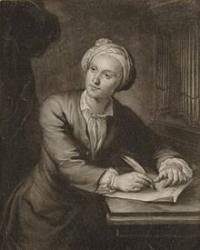Planning worship?
Check out our sister site, ZeteoSearch.org,
for 20+ additional resources related to your search.
- |
User Links
Person Results
John Frederick Lampe

1703 - 1751 Person Name: John F. Lampe Arranger (probably) of "IRISH" in Great Songs of the Church (Revised) John Frederick Lampe (born Johann Friedrich Lampe; probably 1703 – 25 July 1751) was a musician.
He was born in Saxony, but came to England in 1724 and played the bassoon in opera houses. His wife, Isabella Lampe, was sister-in-law to the composer Thomas Arne with whom Lampe collaborated on a number of concert seasons. John and Isabella's son, Charles John Frederick Lampe, was a successful organist and composer as well.
Like Arne, Lampe wrote operatic works in English in defiance of the vogue for Italian opera popularised by George Frideric Handel and Nicola Porpora. Lampe, along with Henry Carey and J. S. Smith, founded the short-lived English Opera Project. He became a friend of Charles Wesley, and wrote several tunes to accompany Wesley's hymns. His works for the stage include the mock operas Pyramus and Thisbe (1745) and The Dragon of Wantley (1734), which ran for 69 nights, a record for the time, surpassing The Beggar's Opera. He was based for a time in Dublin and later in Edinburgh, where he died.
--en.wikipedia.org/wiki/
See also in:
Wikipedia
John Frederick Lampe
L. C. Everett
1818 - 1867 Composer of "SPRING" in The Songs of Zion L. C. Everett's largest and most popular collection was The Wesleyan Hymn and Tune Book (1859), published by the Methodist Episcopal Church South. The denominational dedication page in that collection says it was "prepared by Mr. L.C. Everett, of Virginia, a gentleman well-known through the South and Southwest, as an author and teacher of sacred vocal music." In his own introductory remarks, Everett's instincts as an educator are clear. He advised churches to offer a weekly congregational singing class "for the purpose of meeting together frequently, say one evening each week, to practice the tunes under the direction of a suitably qualified chorister or leader, and ... that the entire congregation be invited to attend the rehearsals of the class and join in learning the tunes." For Everett, musical worship was not just the duty of a choir, it was the duty of everyone.
Leonard’s brothers were Asa Brooks Everett (1828-1875), N.E. Everett, & Benjamin Holden Everett. Leonard and Asa developed a successful music education system called "The Everett System," and together with R.M. McIntosh they formed the L.C. Everett Company, which employed approximately fifty music teachers throughout the American south and middle Atlantic.
—Chris Fenner
see also J.H. Hall, Biography of Gospel Song and Hymn Writers (New York: Fleming H. Revell, 1914), pp. 96-100.
L. C. Everett
William Weale
Composer of "BEDFORD" in Hymns of the Living Church See Wheall, W. (William), c. 1690-1727
William Weale
Garret Colley Wellesley, Earl of Mornington
1735 - 1781 Person Name: Mornington Composer of "KENT" in New Manual of Praise Garret Colley Wellesley, Earl of Mornington, father of the Duke of Wellington; b. Dongan, Ireland, 1735; d. there, 1781
Evangelical Lutheran Hymnal, 1908
Garret Colley Wellesley, Earl of Mornington
Robison
Person Name: J. Robertson Composer of "Fiducia" in A New Hymnal for Colleges and Schools The Southern Harmony, 1835, ascribes the tune FIDUCIA to "Robison". The same tune, in 1913, was credited to "J. Robertson" by the editor of The Good Old Songs. Whether this composer is the same as, or otherwise related to, the "J. Robison" who published a Methodist hymn book in 1873, remains unclear.
Robison
Homer N. Bartlett
1845 - 1920 Person Name: H. N. Bartlett Composer of "WILLIAMS" in The Academic Hymnal Homer Newton Bartlett, a pianist, organist and prolific composer, was considered during his lifetime to be in the front rank of American musicians. He was born on December 1845 in Olive, New York, the descendant of a long line of illustrious New Englanders. A musical prodigy from childhood, he studied piano and composition with a number of well-known teachers, including Emil Guyon and S.B. Mills, and took up his first position as a church organist at the age of fourteen.
In August 1864, the summer after he turned eighteen, Bartlett enlisted as an infantryman in the 64th New York Regiment. He was mustered out the following year at the end of the war. Bartlett spent his adult life in New York City, where he was organist and musical director at two prestigious Protestant churches. For twelve years he served at the Marble Collegiate Church, the Dutch Reformed church founded by Peter Minuit, which is the oldest Protestant congregation in North America; he then moved to the Madison Avenue Baptist Church, where he remained for the next thirty-one years. At the same time, he was composing and publishing musical works in a variety of genres, from voice-and-piano pieces intended for middle-class drawing rooms to grand symphonic works such as Apollo, a “symphonic poem” based on the Iliad. He was a founding member of the American Guild of Organists, served as president of the National Association of Organists, and won a number of musical competitions, including a 1905 composition contest sponsored by the piano manufacturers Kranich & Bach. He died in April 1920.
Nancy Naber, from the New York State Library/Manuscripts and Special Collections
http://www.nysl.nysed.gov/msscfa/pr/sc23062.pdf
Homer N. Bartlett
John Clements
Person Name: J. C. Author (chorus) of "I've Been Redeemed" in The Gospel Trumpeter
John Clements


 My Starred Hymns
My Starred Hymns

